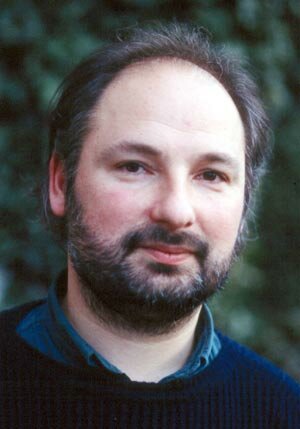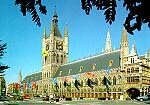
Inside the 'In Flanders Field Museum' in the Cloth Hall of Ypres
 Piet Chielens (picture right), the manager of the new Great War museum in Ypres, was born in Reningelst, on the verge of the old battlefields south of Ypres. As a child he played in trenches and shell holes.
Piet Chielens (picture right), the manager of the new Great War museum in Ypres, was born in Reningelst, on the verge of the old battlefields south of Ypres. As a child he played in trenches and shell holes.
When Piet went to school he used to walk right through a allied war cemetery, watching the headstones. "That is how I learned geography", he says. "I asked the teacher: 'Sir, what is Yorkshire? Where are the Bermuda's?"
Chielens neighbour had no hands - because he had lost them in the Great War. "That teached me to take some distance from the exited stories on heroism and bravery and national pride and victories", Chielens says quietly. "When I think about war I see a man without hands."
Children of today don't have people around them anymore who can tell of their own experiences in that war. So this is what the new museum in Ypres - called 'In Flanders Fields' (after the famous poem by John McCrae) - wants to do.
"The generation who lived through 1914 - 1918 is dying out. The oral history of the war is vanishing with them. Our new museum wants to keep these stories alive for the young people of today. To let them see through the pathos. To confront them with the reality, experienced by real people. As a lasting protest against the war, and as a cry for peace."
Cloth Hall
This extraordinary museum opened in spring 1998. It is located on the first floor of the replica of the famous Cloth Hall in Ypres .
The battlegrounds around this medieval Belgian town are among the most notorious in the world. The German and the Allied forces fought for four long years without a decisive victory ever emerging. New weapons such as toxic gas, land mines and flame throwers made it even more horrific. The toil: 1.200.000 wounded and 500.000 dead. The remains of 100.000 soldiers have never been identified - their bodies were teared asunder and scattered in the mud of Flanders.
 The new 'In Flanders Fields' is a rebuild of the old dusty WW1-museum in the same Cloth Hall-building (picture right). The old museum had worn out; even the schoolclasses began to stay away. The aim was to make something so special that it would attract at least 120.000 visitors a year. The restyling took more than a year and the results are astonishing.
The new 'In Flanders Fields' is a rebuild of the old dusty WW1-museum in the same Cloth Hall-building (picture right). The old museum had worn out; even the schoolclasses began to stay away. The aim was to make something so special that it would attract at least 120.000 visitors a year. The restyling took more than a year and the results are astonishing.
"Our new museum is not a traditional war museum anymore", Chielens explains. "It is not about the commanders and the strategists, but about the ordinary people who endured this war. The soldiers, nurses, refugees, the children... the focus is on their experiences, on their daily life."
Personality
To accomplish this the museum uses advanced technology: computers, videos, interactive models, cd-roms. Everywhere there are sounds - the rattling of a machinegun - cries, music, voices. Suddenly a film starts, images appear on walls. There are slides and pictures - some of them amazing and never shown before, like the one with a German soldier posing above the corpse of the Frenchman killed by gas (the German had sent this picture to his girlfriend at home).
In for a thrill? At the entrance of the museum the visitor can choose and adopt a personality that in 1914 - 1918 really existed: a soldier, a nurse, a villager, a child. There are many to choose from. A computer gives you details about this personality.
During your walk through the museum you can ask computers at several moments what your character did or experienced during that specific time, or in this or that battle. You relive the war like this person did in reality.
When you've chosen to be a soldier, don't be too shocked when at the end of the tour you learn you've died. The museum will then supply you with the exact whereabouts of your grave.
The In Flanders Fields museum is open:
- from April - September: every day from 10.00 to 18.00 hours;
- from October - March: from Tuesday to Sunday from 10.00 to 17.00 hours.
The museum is closed during an annual holiday: the first three weeks following the Christmas holidays.
The telephone number of the museum is: 0032.57.228584.
Click on to send the staff an email message or an inquiry.
The museum features its own website: .